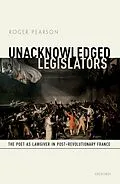What is the public value of poetry? How do poets envisage their own role and function within society? How do we? Do poets seek to shape public opinion and behaviour? Should they? Or do they offer alternatives--perhaps sacred alternatives--to political and religious ideologies? Are they what Shelley in 1821 called 'the unacknowledged legislators of the World'? And what might that mean? During the decades immediately preceding the Revolution of 1789 the status of contemporary poetry in France was at its lowest ebb. At the same time the perceived power of the writer to influence public events reached a high-water mark with Voltaire's triumphant return to Paris in 1778. In the course of the next century French poetry enjoyed an extraordinary renaissance and flowering, perhaps its greatest. But what of the poet's public influence? In 1881 the people of Paris processed for six hours past the home of Victor Hugo on the occasion of his 79th birthday, and in 1885 an estimated two million people witnessed his state funeral. But who or what were they acknowledging? Poetry or republicanism? Or perhaps their own power? For with each Revolution that passed--1789, 1830, 1848--French poets themselves felt increasingly marginalised. This study addresses the first part of this story and focuses on the role and function of the poet during the so-called Romantic Period. Beginning with an account of the literary climate in pre-revolutionary France it then maps the changes in that climate wrought by the events of the 1789 Revolution. It describes the new politico-literary agendas set by Chateaubriand and others on the monarchist Right, and by Staël and others on the liberal Left. Against this background it then analyses in detail the poetic output and public exploits of the three major French poets of the period: Lamartine, Hugo, and Vigny. The Romantic figure of the poet as prophet and magus is habitually dismissed as a cliché. But by focusing on the role of the poet as lawgiver this book reveals the rich and complex terms in which the public function of poetry was debated in post-revolutionary France - and how amidst the centenary celebrations of 1889, as Romanticism gave way to Symbolism, the poet as lawgiver continued to play a central part in that debate.
Autorentext
Roger Pearson is a Professor of French at the University of Oxford and Fellow and Tutor in French at the Queen's College, Oxford. His research is focused on French literature of the eighteenth and nineteenth centuries, and his publications include monographs on Stendhal, Voltaire, and Mallarmé, as well as translations of Voltaire, Zola, and Maupassant. This book marks completion of the first part of a research project on the Poet as Lawgiver in Nineteenth-Century France, for which he was awarded a Major Leverhulme Research Fellow (2009-11). He is a Fellow of the British Academy.
Inhalt
Prologue; Introduction: The Poet and the Law; 1 Unacknowledged Legislators; 2 The Poet as Lawgiver in Post-Revolutionary France; II Avant le deluge (1750-1789); 3 Towards a Happy Revolution; III Apres le deluge: Chateaubriand's Melancholy; 4 Revolution, Religion, and Poetry; 5 Politics and Writing; IV Apres le deluge: Stael's Enthusiasm; 6 The Woman Writer as Lawgiver; 7 The Woman Writer as Lawgiver; 8 The Lawgiver as Novelist: 'Delphine' (1802); 9 The Lawgiver as Poet and Outlaw: 'Corinne' (1807); 10 The Lawgiver as Poet: 'De l'Allemagne' (1810/1813); 11 Poetry as Self-Legislation; V Left or Right?; 12 Poetry after the Revolution; VI Lamartine's Murmur: Poetry, Politics, and Prayer; 13 The Poet as Lawgiver; 14 The Poet as Politician; 15 The Poet at Prayer; VII Hugo's Intimacy: The Private, the Public, and the Visionary; 16 Private or Public?; 17 Olympio; 18 The Poet as Lawgiver and Visionary; 19 The Poet as Genius and Promontory; VIII Vigny's Elixir: Pity, Enmity, Posterity; 20 A Purpose for Sadness: 'Poemes antiques et modernes' (1826); 21 Poets and their Enemies; 22 Words of Honour: 'Les Destinees. Poemes philosophiques' (1838-1864); 23 Afterlives: 'Daphne' and the Poetry of the Future; IX Conclusion: Beyond Melancholy, or a Ministry of Poets; 24 1789 and after; 25 14 July 1889; Epilogue
